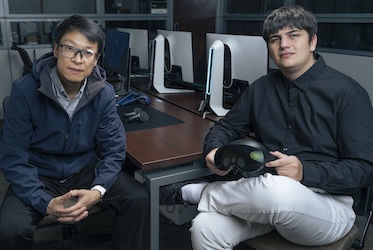

KENNESAW, Ga. | Sep 12, 2019
Kennesaw State, Haskell partner to develop innovative construction safety aid
Seeking to enhance its existing safety material, leading architecture, engineering and construction firm Haskell has partnered with Kennesaw State University’s College of Computing and Software Engineering on developing an innovative virtual reality training aid.
The project, known as the Hazard Elimination/Risk Oversight (HERO) program, is an immersive simulation that teleports users into a virtual construction site riddled with potential hazards in an effort to reinforce safety training among its employees. Originally conceived by Dysruptek, the corporate venture arm of Haskell tasked with developing emerging construction technologies, the program was refined by a team of Kennesaw State software developers and students over a six-month period.

HERO works by mimicking an actual wastewater treatment plant project handled by Haskell in St. Petersburg, Fla. Using 3D and drone imagery to recreate the setting, the program is populated by randomized characters and hazards, such as unprotected leading edges, in order to test the users’ ability to recognize jobsite hazards. Users can tag objects spread throughout the timed simulation and are given a score based on how many at-risk observations they discovered. In addition, users can identify safe conditions and tag them accordingly.
“We saw this as a way to gamify our safety protocols and make it stickier so that folks in the field have a better grasp on what they’ve received training for,” said Cutler Knupp, director of strategy and technology investments at Dysruptek. “What we noticed is those on jobsites sometimes don’t look for potential hazards beyond the purview of what they were working on. For instance, an excavator operator might not always notice electrical hazards. Using HERO, we can put them in a safe environment to strengthen their training.”
Hamzah Shanbari, manager of construction technology and innovation at Dysruptek, said the project can trace its roots to his doctoral dissertation at the University of Florida, in which he developed an educational video game to teach high-level construction management concepts. Eager to apply a similar concept at Haskell, he began building HERO on the Unity gaming platform but was unable to commit to the project full time. The company engaged a number of professional software developers for proposals to complete HERO before Knupp, a 2012 graduate of KSU, suggested they reach out to the University’s computer game design and development faculty.
After meeting with CCSE Dean Jon Preston to share its vision for what the project could be, Haskell was introduced to a team composed of assistant professor of gaming Rongkai Guo and VR software developer Jaylin Gillam, and student assistants Luke Crowley and Michael Revit, who immediately began work on perfecting the program.
“We knew there were several key areas that needed refining, such as the user interface and the total performance of the program,” Gillam said. “It was pretty advantageous that they were already using Unity, which is a tool all of our computer game design and development graduates are trained to use. We were able to jump right into the project and start making improvements.”
Throughout the process, Haskell was awestruck by the work produced by the University, Hamzah said. Over the last six months, both groups would hold conference calls and in-person meetings to discuss HERO’s progress and provide feedback before delivering the latest version in early August.
“I’ve been super impressed with everything they’ve delivered so far,” Hamzah said, adding that the program was well received at a recent industry conference. “We’re so much closer to the vision that I had, and it has the potential to be much more inclusive to different kinds of work environments. We have a lot of interested parties, and we are going to continue to develop this concept while we determine the best use for the technology.”
– Travis Highfield
Photos by David Caselli

Student, faculty researchers explore how AI can improve STEM learning through virtual reality

Student, faculty researchers use AI to improve early detection and diagnosis of Alzheimer's disease

Kennesaw State researchers use drones, artificial intelligence to improve disaster response

Research conducted by Kennesaw State student could lead to faster, more efficient electronics
A leader in innovative teaching and learning, Kennesaw State University offers undergraduate, graduate, and doctoral degrees to its more than 51,000 students. Kennesaw State is a member of the University System of Georgia with 11 academic colleges. The university's vibrant campus culture, diverse population, strong global ties, and entrepreneurial spirit draw students from throughout the country and the world. Kennesaw State is a Carnegie-designated doctoral research institution (R2), placing it among an elite group of only 8 percent of U.S. colleges and universities with an R1 or R2 status. For more information, visit kennesaw.edu.